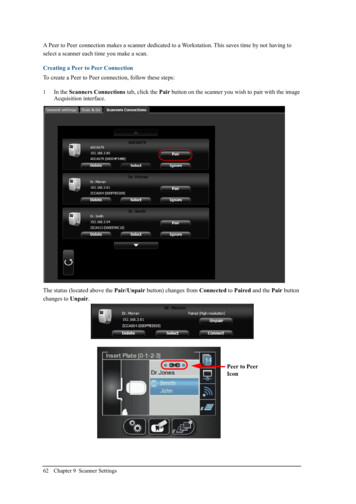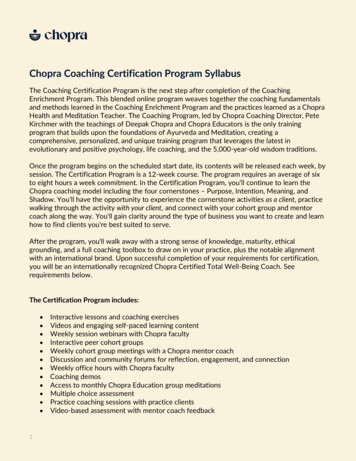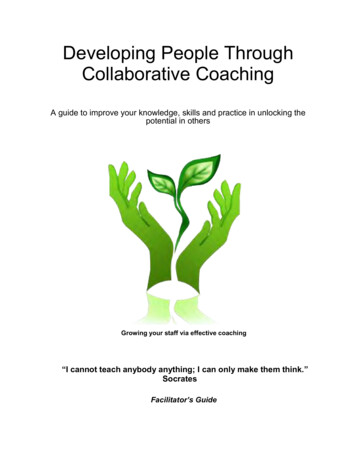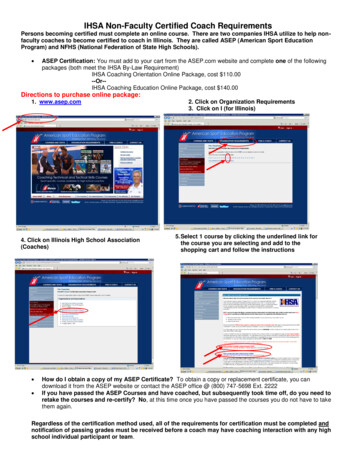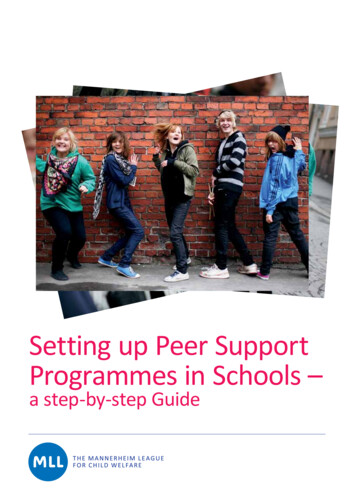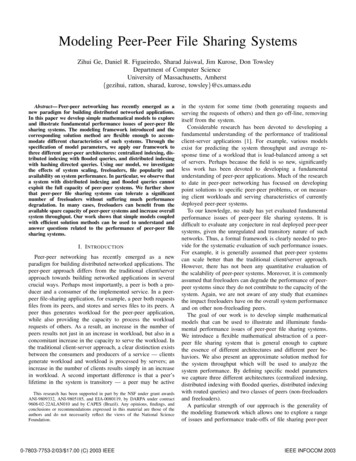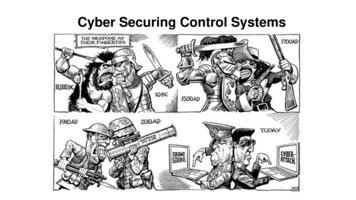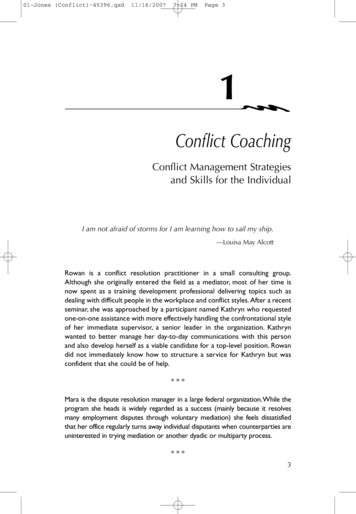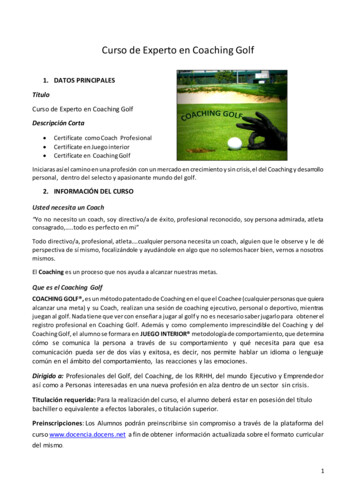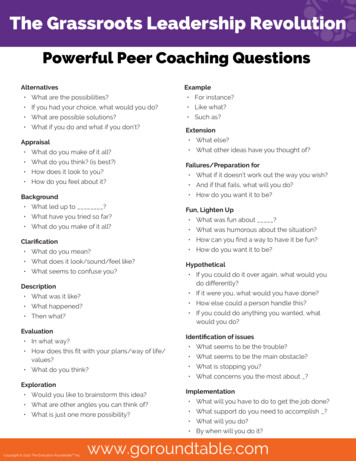
Transcription
The Grassroots Leadership RevolutionPowerful Peer Coaching QuestionsExampleAlternatives What are the possibilities? For instance? If you had your choice, what would you do? Like what? What are possible solutions? Such as? What if you do and what if you don’t?Extension What else?Appraisal What do you make of it all? What do you think? (is best?) How does it look to you? How do you feel about it? What other ideas have you thought of?Failures/Preparation for What if it doesn’t work out the way you wish? And if that fails, what will you do? How do you want it to be?Background What led up to ? What have you tried so far? What do you make of it all?Fun, Lighten Up What was fun about ? What was humorous about the situation? How can you find a way to have it be fun?Clarification What do you mean? What does it look/sound/feel like? What seems to confuse you?Description How do you want it to be?Hypothetical If you could do it over again, what would youdo differently? If it were you, what would you have done? What was it like? How else could a person handle this? What happened? If you could do anything you wanted, whatwould you do? Then what?EvaluationIdentification of issues In what way? How does this fit with your plans/way of life/values? What do you think?Exploration Would you like to brainstorm this idea? What are other angles you can think of? What is just one more possibility? What seems to be the trouble? What seems to be the main obstacle? What is stopping you? What concerns you the most about ?Implementation What will you have to do to get the job done? What support do you need to accomplish ? What will you do? By when will you do it?Copyright 2020 The Executive Roundtable Inc.www.goroundtable.com
The Grassroots Leadership RevolutionPerspectiveInvolvement What was your part in this? How do you fit into the picture? What were you responsible for?Information What would you like to be doing five years fromnow? In the bigger scheme of things, how important isthis? What do you plan to do about it? What information do you need before youdecide? What is your game plan? What do you know about it now? How do you suppose you could improve thesituation? How do you suppose you can find out moreabout it? What kind of picture do you have right now? What kind of plan do you need to create?Predictions How do you suppose it will work out?Integration What will that get you? How do you explain this to yourself? Where will this lead? What was the lesson/learning? What are the chances of success? How can you lock it (the learning) in? How would you pull all this together?Relation If you do this, how will it affect ?New Start What impact will that have on balance/values? If you had free choice in the matter, what wouldyou do? If the same thing came up again, what wouldyou do? If we could wipe the slate clean, what wouldyou do? If you could do it over again, what would youdo? How do you fit into the picture? How does this affect the whole picture? What else do you need to take intoconsideration?Taking Action What action will you take? And after that? What will you do? When? Where do you go from here? When will you dothat? What are your next steps? By when?Opening What would you like to focus on today?Summary What would you like coaching on today? How is this working? How is this going? What would you like to explore today? How would you describe this? What do you think this all amounts to?Planning Outcomes What do you want? What is your desired outcome? If you got it, what would you have? How will you know you have received/reachedit?Copyright 2020 The Executive Roundtable Inc. How would you summarize the work/effort sofar?This list of powerful questions is courtesy of theCoaches Training Institute. For information on theirvarious training programs, visitwww.coactive.com.www.goroundtable.com
Peer Coach Facilitator Playby PlayYour role as Mentor Coach See yourself as the “guide on the side” versus the “sage on the stage”Bring in a high amount of positive energy and keep the flow lively and on timePay attention to all of your group – notice their energy, ensure all membersget equal airtime, that they follow the peer coaching method, that their inputis succinctYour group will expect you to manage the group and process in a diplomaticwayNew to This? Recruit a timekeeper to keep you on trackPost the peer coaching steps on a flipchart (if in person) or email in advance (ifvirtual)Focus on your group members rather than trying to participate in the peercoaching questions and mentoringBe preparedPreparing to Facilitate a Peer Coaching SessionSTEP ONEEach group member provides a ‘1 minute’HEADLINE: Members share a specificheadline to outline their issue.challenge and opportunity. Remind the group to give you the top-line on their peer coaching challenge Use the 'headline’ sign to gently move a member to be succinct Write the coaching topics on a flipchart so it’s easy to refer to Time permitting, you may be able to do more than one topic depending onthe complexity It’s more important to do a thorough coaching on one topic than rushingthrough two topics Allow about 20 minutes on average for a peer coaching topic
STEP TWOSELECT: Group members prioritize thechallenges/opportunities they wouldlike to bring to the group. Group votes to decide which person’s topic/issuewill be selected. Consider: Time sensitivity Complexity of challenge (is it toobroad/too early to discuss?) Readiness of the individual to participate Shared opportunity (e.g. if someonehasn’t had a turn yet)Note if any of the topics have the same theme – sometimes handling onetopic, will also serve another group member with the same challengeFirst ask if the situations have a timeline or heightened importance to thegroup memberAsk if any of the group members have not had a chance to be peercoachedAsk the group if any of the topics are particularly interesting or would behelpful to do (NOTE: only allow a minute or so for input)STEP THREEThe selected group member is given 5 minutesSHARE: The selected group membershares their challenge/opportunity in to share the key elements of the situation.more detail. Ask the member to share information about what they have tried, keyplayers, what has worked, where they feel stuck, etc. Ask the member what specific aspect of the challenge/opportunity theywould like to be coached onSTEP FOURGroup members ask coaching questions (noCOACH: Other group membersadvice or suggestions) to uncover root issues.engage in coaching questions todeepen their understanding of themember’s situation.Tips for questions: Allow some context questions but the focus is on helping the person beingcoached to explore their challenge by asking diverse questions (i.e. Whatoutcome do you want? What are you worried about? What do you thinkshould be your next step?) Listen for leading questions, longer questions tend to be leading Open ended questions Listen for solutions disguised as questions (“Have you tried X?” versus“What have you tried?”) Encourage the group to reword any questions that are leading or aresolution-based to a “coaching question”
When the energy goes down or questions become repetitive quicklyconfirm that there are not more questions and move to Step FiveCoaching the person: Listen for signs that the coachee is starting to explore their situation (i.e.“Hmm, that’s a good question!”, “I hadn’t thought about that.”) Look for shifting body language that may identify that there’s a place formore exploration questions Save your questions until the end and ask only if 1) your question wasn’tasked by the group and 2) you feel there was a line of questioning thatwas missedSTEP FIVECONFIRM: Confirm with the member inthe coaching seat where they wouldspecifically like support. After 10 minutes of questions, check in with theselected member to see what, if anything, hasshifted for them and where they would like somementoring support from their peers.Often, the original issue can shift once questions are askedIf you are unclear, ask the member “Where do you want your group’s helptoday?”STEP SIXMENTOR: Group members may nowshare experiences, observations, andinsights to provide support to help. During this stage, the member is no longerallowed to speak or react instead, they areencouraged to take notes and listen.The group can now provide feedback to help theindividual build their action plan. The key is thatmembers should speak from personal experienceand not “finger wag” by listing off a variety of“should dos.” Use the language, “in myexperience.” Providing support andencouragement is also welcomed at this stage.The coachee is encouraged not to speak but instead used a pen and paperto take notesRemind the group to keep their mentoring succinct so that the coachee canget as many ideas as possible to take away (use the “bottom line” handsignal)The longer the suggestion, the more likely it’s being “sold” to the coacheeIf the coachee wants to comment or ask a question, ask them to do so afterthe session is doneDon’t allow any group members to comment on the advice being given –the person being coached is completely capable of deciding how to handletheir situationOnce the energy lulls, confirm that all mentoring ideas have been sharedand move to the next stage
STEP SEVENREFLECT: The member being coached The member being coached can now share theirfeedback and reactions to the process.can now share their feedback andreactions to the experience. The member is sharing specific comments on the overall effectiveness ofthe experience Asking “What was your experience on the hot-seat?” directs the member tocomment on what it was like being coached versus giving a critique of thesuggestions received Thank the group for their participation Generally (not individually) give recognition if you heard a good question,diverse perspectives and saw that the process was followed
The Grassroots Leadership RevolutionProgress Check-InReflect on your progress since your peer coaching session.Based on my previous commitments, I completed or made progress on.What I’m most proud of:What I’ve learned from my actions:Things I need to do next to make progressagainst my goals:What I want to get out of this session:My CommitmentsBefore the next session, I will:ActivityCopyright 2020 The Executive Roundtable Inc.InitiatedCompleted www.goroundtable.com
PLAYBOOK: SESSION TWOSession Length: 80 – 95 minutes5 minutes Leader welcomes group.10 minutes Group provides updates on one success and one learning sincethe last meeting.45-60 minutes, Peer Coaching Select 2 to 3 challenges based on time available.10 minutes, Session Debrief What worked in our peer coaching session? What coaching skills would you like to work on for next time? How might you use this coaching structure with your teams?10 minutes, Wrap Up Discuss next session pre-work. Each person share one key commitment to be completed by nextsession.
more exploration questions Save your questions until the end and ask only if 1) your question wasn't asked by the group and 2) you feel there was a line of questioning that was missed: STEP FIVE : CONFIRM: Confirm with the member in the coaching seat where they would specifically like support. After 10 minutes of questions, check in with the


